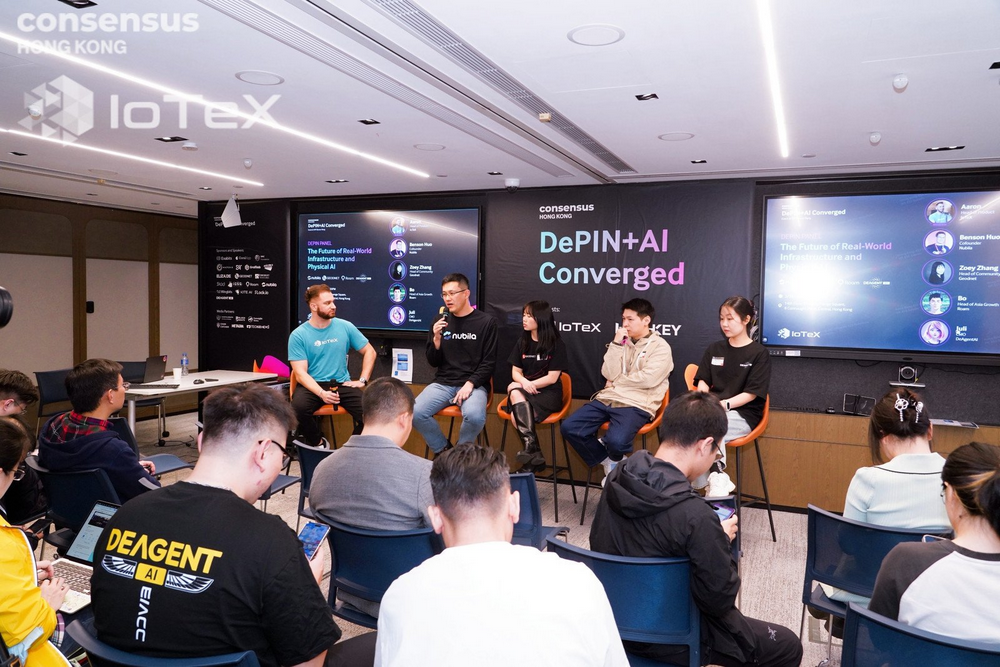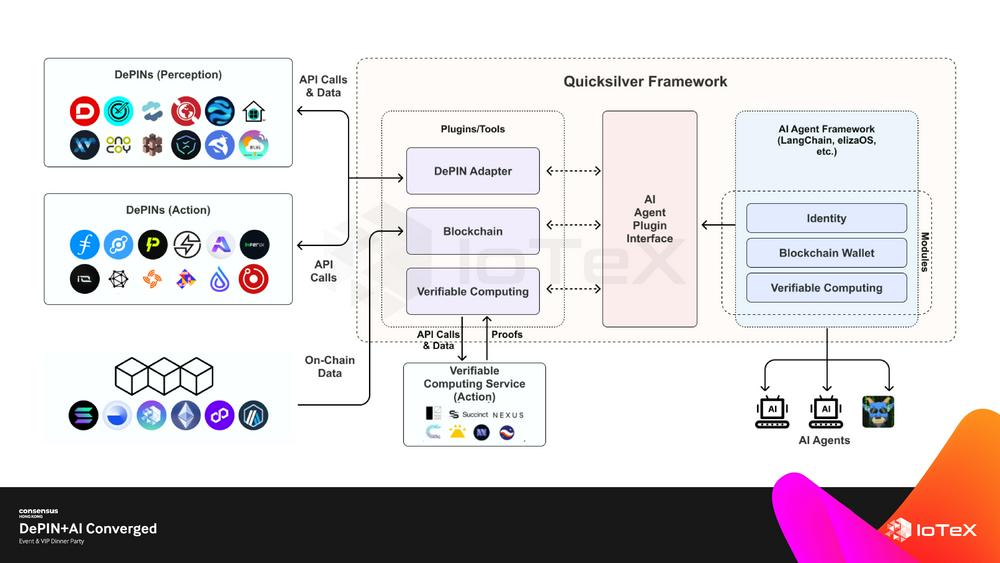As the global technology industry accelerates its move toward intelligence, a cutting-edge forum focusing on the integration of decentralized physical infrastructure networks (DePIN) and artificial intelligence (AI) - "DePIN + AI Converge" was successfully held in Hong Kong on February 18. The event was co-hosted by IoTeX and Hashkey, attracting more than 800 registrations, and more than 250 industry leaders, technology developers, investors, and people from all walks of life who are interested in emerging technology trends attended to discuss the huge potential and future opportunities brought by the combination of DePIN and AI.
DePIN+AI: Pattern, Status Quo and Paradigm Shift
At the beginning of the event, Andrew, head of IoTeX Asia Pacific, and Aaron, head of products, jointly delivered a keynote speech entitled "DePIN+AI: Pattern, Current Situation and Paradigm Shift". In recent years, artificial intelligence technology has shown explosive growth, attracting a lot of venture capital. According to analysis data from Crunchbase and Aventis Advisors, the investment in the AI track has increased year by year from US$1 billion in 2010, and is expected to reach US$78 billion in 2024 (Microsoft's investment in ChatGPT alone is as high as US$10 billion). Data analysis shows that most investments are concentrated in the A round, indicating that capital prefers AI startups and is willing to obtain excess returns through long-term companionship. At the same time, huge investments from technology giants such as Microsoft have further promoted this trend.
One particularly attractive point in the speech was the market.us forecast that the agent-based artificial intelligence market in the AI track is expected to grow significantly in the next decade, from $520 million in 2024 to $196.6 billion in 2034, with a compound annual growth rate of 43.8%. This assessment is certainly not made in vain. AI has a profound impact on the labor market in terms of reducing costs. As AI capabilities increase, production costs are shifting from labor to software. When customer service demand increases relative to today (1 to 8 times), the cost per conversation will decrease, resulting in higher cost savings. For example, when the demand for conversation increases to 8 times the current level, the cost per conversation will be reduced to $0.125, which is expected to save $54 billion in production costs.

In this transformation, AI has huge demands for DePIN resources in four aspects, namely computing power, bandwidth, energy and data. We can find some clues from the situation of several companies. In the computing power field, Nvidia's quarterly revenue has increased fivefold in the past three years, and in the bandwidth field, the construction of North American data centers has also increased fivefold in the past three years; in the energy field, OKLO alone needs 12.0GW, and TerraPower needs 4.0GW; in the data field, large companies invest more than $500 million each year to purchase wholesale data for training AI models.
Let's look back at the current market status of DePIN. At present, the market share in the field of wireless transmission is 0.002% (leading project Helium), the market share in the field of computing is 0.03% (leading project Filecoin), the market share in the field of energy is 0.001% (leading project Daylight), and the market share in the field of identity authentication is 0.2% (leading projects Worldcoin and Anymal). Although the number of DePIN projects has increased from 100 in 2022 to 1,170 in 2024, the market value has soared from US$5 billion to US$50 billion, and the active node rate has increased from 2% to more than 50%, but DePIN's overall share accounts for only 0.1% of the trillion-dollar AI market. It is no exaggeration to say that this track has a growth potential of 100-1,000 times.
Event Highlights and Outlook
At the event, the IoTeX team also introduced the classic DePIN+AI framework - Quicksilver in detail. Quicksilver is an open source integration framework that combines large language models (LLMs) with DePIN, supports the integration of different DePIN projects through adapters and plug-ins, and provides the necessary tools and interfaces for training AI Agents. Quicksilver provides modules such as identity, blockchain wallet, and verifiable computing. AI Agents can use the data and resources provided by Quicksilver to perform various tasks such as data analysis, decision support, and automated operations. Quicksilver provides a reliable operating environment for AI Agents while ensuring the transparency and security of data processing.

There are many pain points in AI at present. Although they have a variety of functions, they are ultimately just processing some superficial information such as text. Such information is cold and temperatureless, and lacks deep perception and understanding. The DePIN network can be a good "five senses" and "four limbs" for AI. The "five senses" help AI to perceive the real world in an all-round way. Now developers can use ioID and W3bstream to connect real-world devices to the blockchain and use zero-knowledge proofs to verify their real activities. The "limbs" can help AI make accurate judgments based on its own perception and put the judgments into action, which well realizes the "training" -> "modeling" -> "automation" system. IoTeX
Co-founder Jing said at the "Emerging Tech Session-AI Panel" of the Consensus 2025 Hong Kong Summit that IoTeX is developing Physical AI and is committed to connecting real-world data with AI Agents through DePIN, enabling them to perceive events and execute real-world decisions.
The first Physical AI under the Quicksilver framework, “Bino AI”, was developed jointly by Eliza Labs and IoTeX. Bino AI integrates ElizaOS with IoTeX’s DePIN network (such as Nubila weather stations, GeodNet geographic sensor networks, and Pebble Tracker hardware devices), giving AI Agents real-time perception and decision-making capabilities.
As Raullen Chai, co-founder and CEO of IoTeX, said:
“Quicksilver is helping us run experiments to better understand public spending data. Bino is becoming an AI DOGE.”
The "DePIN + AI Converge" event not only provided participants with a platform to gain an in-depth understanding of the convergence trend of DePIN and AI, but also demonstrated innovative applications and future development directions in this field through practical cases. Participants reached a consensus on the key role of DePIN in the resource-intensive future of AI and expressed great concern about the strong potential demonstrated by the Quicksilver framework. With the continuous advancement of technology and the gradual improvement of the policy environment, DePIN + AI is expected to become an important force in promoting the development of the global smart economy.
As the organizer of this event, IoTeX will continue to be committed to promoting the innovation and application of DePIN and AI technologies, and contributing to building a more open, efficient and sustainable smart economic ecosystem.













